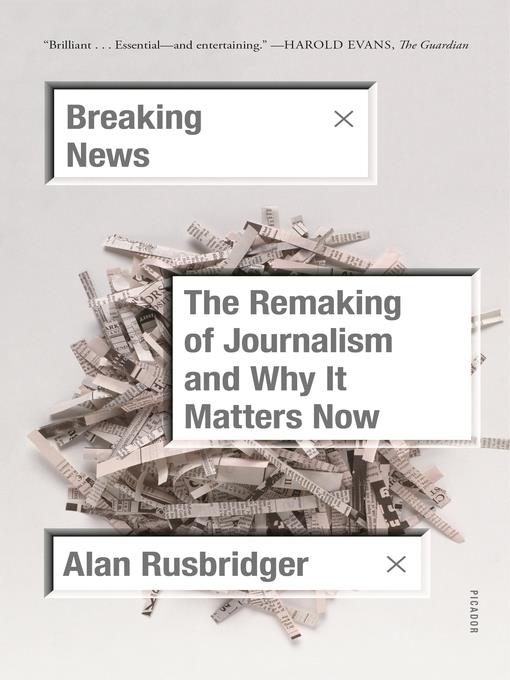
Breaking News
The Remaking of Journalism and Why It Matters Now
کتاب های مرتبط
- اطلاعات
- نقد و بررسی
- دیدگاه کاربران
نقد و بررسی

October 1, 2018
A former editor of Guardian News and Media (1995-2015) chronicles the profound recent changes in journalism using the Guardian's story as his primary illustration.Rusbridger (Play It Again: An Amateur Against the Impossible, 2013), now principal of Lady Margaret Hall at Oxford, shows us continually in his lucid and sometimes-alarming text that technological and cultural changes have occurred so rapidly that newspapers barely had time to inhale before their centuries-old institutions began to crumble, then to reassemble into something quite unrecognizable only a generation ago. The author also tells the tale of how the Guardian metamorphosed during his tenure--from a relatively small newspaper into a web-dominating news presence--but he also narrates the activities of some of the other media giants, including the New York Times and the Washington Post. He highlights the questions that the traditional media were asking themselves: Should we charge readers for online access? How much? And how? (Rusbridger tells us of plans that worked and others that failed.) Should we maintain a print presence? What should be the focus and display of our online offerings? Not surprisingly, the longtime editor of this progressive publication has some sharp words about Rupert Murdoch, Donald Trump, and the proliferation of (and accusations concerning) "fake news." He also takes us through some of the key stories and issues of the time--and describes the Guardian's involvement in them--including Julian Assange and WikiLeaks and Edward Snowden and the issue of government secrets and the sometimes-contradictory right of the people to know. Evident throughout is the author's patent pride in the Guardian and his disdain for writers, publications, and consumers that eschew fact in favor of bias and hype. Rusbridger ends on a note of hope--and concern: "Trust me, we do not want a world without news."In equal measure: informative, alarming, discerning, hopeful, proud, and humble.
COPYRIGHT(2018) Kirkus Reviews, ALL RIGHTS RESERVED.

October 15, 2018
The Guardian began publishing as a local newspaper in 1821. By the twentieth century, it was one of the most widely read and respected English-language papers in the world. Rusbridger was managing editor of the paper from 1995 to 2015, a time of great turmoil for print journalism. While this is essentially an account of his tenure there, Rusbridger also offers fascinating and disturbing insights into the present and future status of journalism in its various manifestations. With pride, he recounts some triumphs of investigative journalism at the Guardian. Rupert Murdoch's phone-hacking efforts were revealed. His paper and the Washington Post shared a Pulitzer Prize for publishing classified information revealed by Edward Snowden. But despite efforts to adapt to internet journalism, the Guardian's financial outlook seriously declined, leading to Rusbridger's concerns about the future of well-researched, fact-based writing. With social media and myriad blogs, vertical reporting (from newspaper to reader) is being eclipsed by horizontal communications that allow unverified and often wild stories to be accepted and shared in seconds. Rusbridger eloquently describes the dangers of this era.(Reprinted with permission of Booklist, copyright 2018, American Library Association.)

November 1, 2018
As editor of London's Guardian newspaper, Rusbridger (chair, journalism, Reuters Inst.; Oxford Univ.; Play It Again: An Amateur Against the Impossible) helped lead the publication into the digital age. His career in journalism began in the early Seventies, which feels like the Bronze Age when he discusses tools of the trade such as the telex network and linotype machines. The Guardian, which is owned by a charitable trust, didn't face the evisceration most American papers have endured in search of dividends yet still struggled with money and circulation, overall weathering the new era better than most. Through this fascinating inside account, each chapter worthy of its own book, Rusbridger discusses how the paper adopted new ways to publish to the Internet and smartphones as well as libel suits, Wikileaks, Edward Snowden, and the experience of other news outlets. VERDICT A must for anyone concerned with the state of journalism today.--Michael Eshleman, Alamogordo, NM
Copyright 2018 Library Journal, LLC Used with permission.

























دیدگاه کاربران